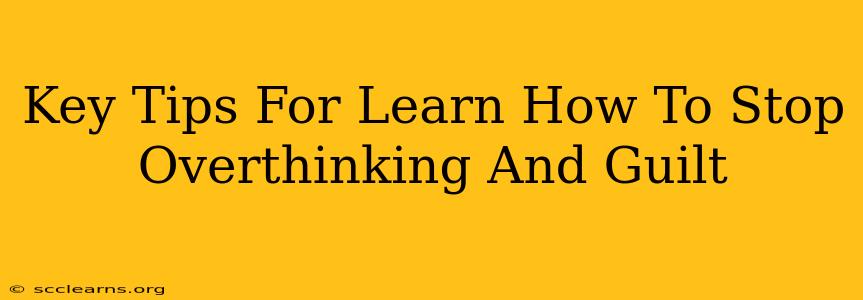Overthinking and guilt can be a debilitating combination, creating a cycle of negative thoughts and self-recrimination that's hard to break. But it is possible to learn how to manage and ultimately stop this destructive pattern. This guide provides key tips to help you regain control of your mind and find peace.
Understanding the Overthinking-Guilt Cycle
Before we dive into solutions, it's crucial to understand why you're overthinking and feeling guilty. Are you a perfectionist? Do you have a history of trauma or difficult relationships? Identifying the root cause is the first step towards effective management. Common triggers include:
- Past mistakes: Dwelling on past actions and their perceived consequences.
- Future anxieties: Worrying excessively about potential problems or negative outcomes.
- Unrealistic expectations: Setting impossibly high standards for yourself and others.
- Low self-esteem: A negative self-image that fuels self-criticism and guilt.
Practical Techniques to Stop Overthinking and Guilt
Now let's explore practical strategies to break free from the cycle:
1. Challenge Your Thoughts
Overthinking often involves distorted or negative thinking patterns. Learn to identify and challenge these thoughts. Ask yourself:
- Is this thought truly accurate? Often, our anxieties exaggerate the reality.
- What evidence supports this thought? And what evidence contradicts it?
- What would I tell a friend who had this thought? Offering compassionate advice to yourself can be incredibly helpful.
2. Practice Mindfulness and Meditation
Mindfulness techniques help you focus on the present moment, reducing the power of overthinking about the past or future. Regular meditation can significantly improve your ability to observe your thoughts without judgment, allowing you to detach from negative thought patterns. Even short, 5-10 minute sessions can make a difference.
3. Engage in Self-Compassion
Treat yourself with the same kindness and understanding you would offer a close friend struggling with similar issues. Acknowledge your imperfections and accept that making mistakes is a normal part of life. Self-criticism only exacerbates guilt; self-compassion fosters healing.
4. Physical Activity and Healthy Habits
Regular exercise releases endorphins, which have mood-boosting effects. Prioritizing physical health, including adequate sleep, a balanced diet, and limiting alcohol and caffeine, significantly impacts mental well-being. A healthy body supports a healthy mind.
5. Seek Professional Help
If you're struggling to manage overthinking and guilt on your own, don't hesitate to seek professional help. A therapist can provide tailored strategies, tools, and support to overcome these challenges. Cognitive Behavioral Therapy (CBT) is particularly effective in addressing negative thought patterns.
Breaking the Cycle: A Long-Term Approach
Stopping overthinking and guilt is a journey, not a destination. It requires consistent effort and self-compassion. Be patient with yourself, celebrate small victories, and remember that setbacks are part of the process. By implementing these tips and practicing self-care, you can significantly reduce the power of overthinking and guilt, creating a more peaceful and fulfilling life.
Keywords: Stop overthinking, guilt, overthinking and guilt, manage overthinking, reduce guilt, mental health, mindfulness, meditation, self-compassion, cognitive behavioral therapy (CBT), anxiety, perfectionism, self-esteem, healthy habits, practical tips.

